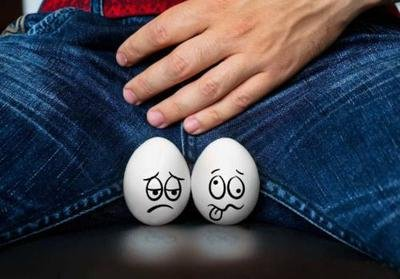Does Epididymitis Cause Testicular Atrophy?
Epididymitis is a common inflammation of the male reproductive system, usually caused by an infection of bacteria. Some people are concerned about whether epididymitis can lead to testicular atrophy.

The epididymis is an organ located above the testicles and closely related to the testicles. Symptoms include pain, swelling, and redness in the testicular region.
Although epididymitis can cause discomfort in men, it does not typically lead to testicular atrophy. Testicular atrophy is a condition that manifests itself as a reduction in the size of the testicles, which can negatively affect a man's fertility. There are many causes of testicular atrophy, including varicocele, testicular torsion, and testicular tumors, and epididymitis is not a major cause of testicular atrophy.
So why do some people think that epididymitis causes testicular atrophy?
On the one hand, testicular pain and discomfort caused by epididymitis can put the testicles in a state of tension and constriction, giving the illusion that the testicles are shrinking.
On the other hand, epididymitis may cause mild swelling of the testicles, making them appear enlarged when they are actually due to edema, for example.
In addition to this, some people may confuse epididymitis with other conditions. For example, varicocele is a common condition that causes the testicles to shrink.
It is important to note that epididymitis is not entirely immune to testicular atrophy.
If epididymitis leads to complete obstruction of the epididymis, the sperm flow is blocked, or the inflammation of the epididymis violates the blood vessels of the testicles, leading to ischemia and narrowing of the testicular arteries, which can cause testicular atrophy. Moreover, testicular atrophy is irreversible.
Therefore, after having epididymitis, patients need to be actively treated to avoid causing testicular lesions, which may lead to the risk of sperm deformities or azoospermia in men of childbearing age.
Antibiotics mainly treat epididymitis to eliminate the infection and can also be treated by traditional Chinese medicine. Patients can take Diuretic and Anti-inflammatory Pill orally, which possess the main effects of clearing away heat and detoxifying the body, promoting blood circulation, removing blood stasis and relieving pain, and inducing diuresis for treating stranguria. Timely medication can eliminate the patient's inflammation and prevent causing testicular lesions.
Patients can also use hot compresses and bed rest to relieve symptoms. In case of persistent pain, swelling, and other symptoms, seeking medical attention for further examination and treatment is recommended.
Men in daily life should also pay attention to the prevention of epididymitis; they can take the following practices:
1. Maintain genital hygiene. It is a crucial way to prevent epididymitis. When taking a bath every day, patients should pay attention to washing their genitals and keeping them dry.
2. Avoid holding urine. When there is urine, it must be discharged; avoid developing the habit of holding urine. Patients should relieve mental stress at work and in life to avoid neuromuscular dysfunction and prevent urinary reflux.
3. Reduce the burden of epididymis. Do not have intercourse too often to reduce the degree of congestion in the sexual organs and reduce the workload of the epididymis. Men can also reduce the burden on the epididymis in their daily lives, for example, by applying more warm compresses to the scrotum. You can wear a cloth scrotal support if you stand or walk a lot.
4. Strengthen the body's immunity. It is also an important way to prevent epididymitis. Patients can strengthen their body's immunity through proper exercise and dietary regimens.
5. Regulate diet. To prevent epididymitis, men need to eat more vegetables and fruits such as grapes, kiwi, mango, etc., and avoid spicy and greasy foods. Men can also eat more food that cleanses the bowels and keeps the bowels dry.
In summary, epididymitis does not usually lead to testicular atrophy. But, if the patient experiences persistent testicular pain and swelling, seeking medical attention for further examination and treatment is recommended.
You may also be interested in:
Does Epididymitis Cause Low Testosterone?
Can People With Epididymitis Eat Scallops?
Why Does Epididymitis Cause Abdominal Pain?



